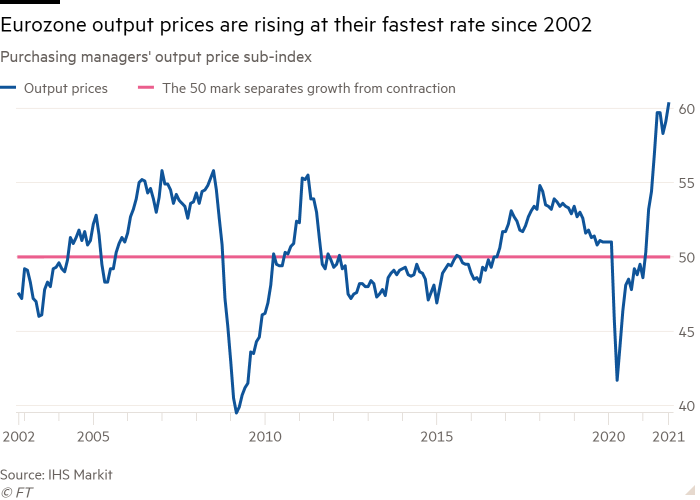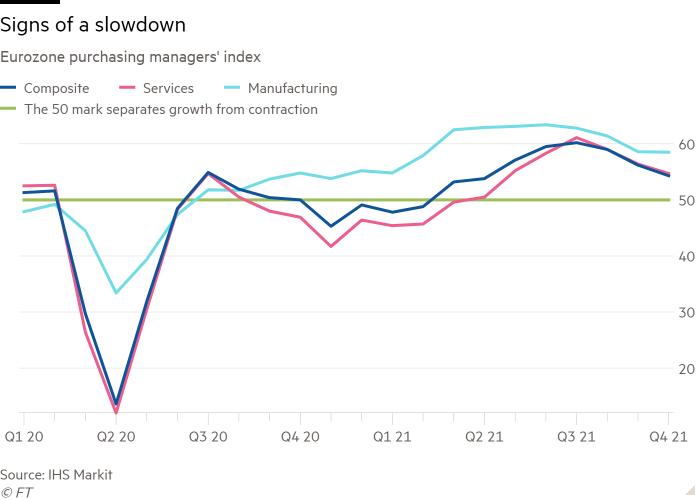Business activity in the eurozone grew at its slowest pace for six months due to a further worsening of the global supply chain problems that are causing huge order backlogs in factories, growing congestion at ports and widespread shortages.
Costs for manufacturing and services companies also rose at their sharpest-ever rate, with groups increasingly passing these costs on to customers, according to IHS Markit’s monthly purchasing managers’ survey. Selling prices advanced at the fastest pace for almost two decades.
The composite purchasing managers’ index, an average for eurozone manufacturing and services, fell more than most economists expected to a six-month low of 54.3 in October, down from 56.2 in the previous month.
The results indicate that the eurozone economy’s recent rebound after the lifting of coronavirus lockdowns is losing momentum in the final months of this year as supply bottlenecks take a greater toll on business activity and increase inflationary pressures.

“A sharp slowdown in October means the eurozone starts the fourth quarter with the weakest growth momentum since April,” said Chris Williamson, chief business economist at IHS Markit. “The ongoing pandemic means supply chain delays remain a major concern, constraining production and driving prices ever higher.”
The steep rise in selling prices also adds to pressure on the European Central Bank when its policymakers meet next week to explain why it thinks the recent jump in eurozone inflation to a 13-year-high is “transitory”.
“The combination of slowing growth momentum and building inflationary pressure could exacerbate divisions within the ECB’s governing council,” said Hussain Mehdi, macro and investment strategist at HSBC Global Asset Management.
While the overall PMI score remained above 50, indicating a majority of businesses were still reporting improvements in activity from the previous month, the slowdown in services was more marked than for manufacturing, according to IHS.

Even so, the survey’s measure of manufacturers’ output fell to a 16-month low, which IHS said reflected how “suppliers’ delivery times lengthened to an extent exceeded over more than two decades of survey history only by that seen back in May”.
The drop was particularly pronounced among carmakers and their suppliers, causing a “near-stalling” of German factory production, it added.
There were also signs that rising input costs caused by supply bottlenecks are spreading from manufacturing to the larger services sector. German services companies reported the fastest increase in overall operating expenses since records began in 1997, IHS said.
In contrast, French services companies reported the strongest pick-up in growth for more than three years. IHS said: “Incoming new business rose at a quickened pace amid reports of new client wins, especially from overseas as looser travel restrictions boosted tourism.”
French manufacturers, however, reported a hefty fall in orders as “severe delays on input deliveries had caused customers to cancel or postpone orders”.
The survey results were “a warning signal” for the eurozone economy, said Ralph Solveen, an economist at Commerzbank. “An end to the sharp rise in prices caused by supply bottlenecks is not in sight in the short term, and the economy should continue to lose momentum in the fourth quarter.”
Jacob Nell, head of European economics at Morgan Stanley, said the results “indicate a continued cooling of activity”. He forecast eurozone economic growth would slow to 1.3 per cent “with risks tilted to the downside” in the final quarter, down from 2 per cent in the third quarter — when those figures are published next Friday — and 2.1 per cent in the second quarter.
"activity" - Google News
October 22, 2021 at 06:12PM
https://ift.tt/3jmiRVB
Eurozone business activity stutters as supply chain woes intensify - Financial Times
"activity" - Google News
https://ift.tt/3ddCXMh
https://ift.tt/2WkO13c
Bagikan Berita Ini















0 Response to "Eurozone business activity stutters as supply chain woes intensify - Financial Times"
Post a Comment